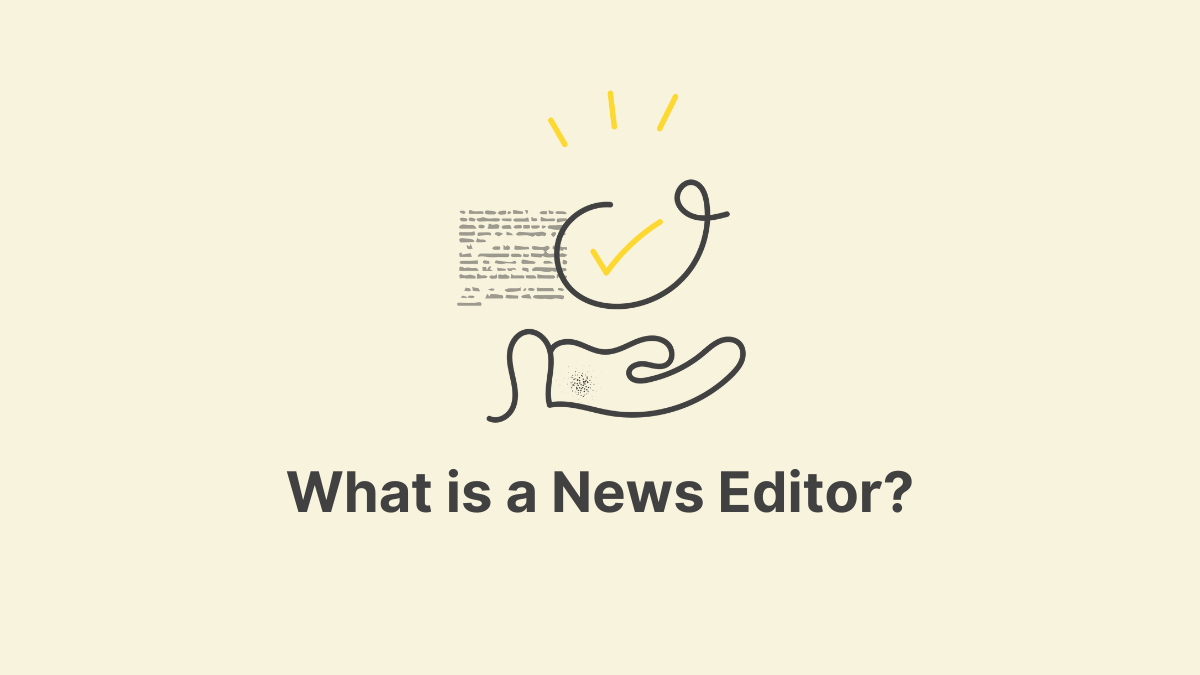What is a News Editor?

According to Indeed, a news editor is a journalism professional responsible for overseeing the news desk and managing content for print, broadcast, or online publications. They supervise and guide reporters to ensure news is engaging, relevant, and accurate.
Editors play a crucial role in shaping stories and have various roles, such as editor-in-chief, managing editor, assignment editor, and copy editor, each with distinct responsibilities.
As a PR professional, you might typically work with assignment and managing editors. What’s the difference?
Assignment editors focus on specific sections, working closely with reporters to assign stories, suggest angles, and provide guidance throughout the writing process. Managing editors oversee daily newsroom operations, ensuring stories meet the publication’s standards.
Responsibilities of an Editor
Editors are the gatekeepers, ensuring news is engaging, well-written but also accurate, and fair. With misinformation spreading fast these days, their role is more important than ever.
In the newsroom, collaboration between editors and reporters is vital to the success of any publication. Editors typically assign stories based on a reporter’s expertise or workload, always keeping timing and relevance in mind.
Keep your pitch timely, clear, and to the point to get an editor's attention. Editors often skim through emails, so a pitch that’s well-crafted and shows you understand their needs has a much better chance of being picked up.
How Editors Control Traffic in the Newsroom
An editor’s desk is busy, so your pitch needs to stand out.
Focus on meaningful stories or significant developments instead of generic product promotions. The best pitches are clear and detailed, covering the who, what, why, and how so the editor doesn't have to follow up with questions—they can decide on the spot.
Tailor your pitch to emphasize its relevance and urgency to boost your chances of getting noticed in their crowded inbox.
We spoke to Brooke Masters, US Financial Editor at Financial Times, on the Coffee with a Journalist podcast. She emphasized the importance of understanding that editors juggle a lot: managing coverage and writing their own stories.
[00:01:43] BM: I've done a lot of different things at the FT, everything from being a regulation correspondent to running the company section to running op-eds and opinion. Now, I am a U.S. financial editor in New York, where I run all of our financial coverage. I report myself and write columns and new stories, but I also run traffic for our larger team and help shape the coverage.
[00:02:11] BB: Wonderful. Do you get tons of pitches still?
[00:02:16] BM: Oh, God, yes. It's not as bad as when I ran opinion, where I got like 250 a day. But I get a good, solid, big group. People are pitching everything from, here's my market commentator that I want you to quote, too, here's our new fabulous product launch of X, Y, Z purple, spotted ETF. There are a few actually new stories that I want to cover, such as, do you realize this proposal is going to make banks uneconomic?
[00:02:46] BB: Since you are editor…you sometimes play traffic control.
Key Points on Pitching Editors
Pitching an editor is a different beast than pitching a reporter. Editors receive numerous pitches daily, so yours needs to be highly relevant to them, their audience, and the current news cycle.
Start with a strong subject line—it’s your first impression and can make or break whether your pitch gets opened or ignored. Think of it as a headline, using key stats or timely news to grab their attention. Words like "exclusive" can help, but only if it’s a true scoop that others will want to cover.
Tim Crino, senior editor at Inc., shared his editorial process.
[0:03:36] BB: How would you describe what your content area is?
[0:03:41] TC: Like the things that I write about?
[0:03:42] BB: Yes, you, as the editor. Versus, “Oh, I send this to one of my freelancers.”
[0:03:48] TC: Yes, it's two things. One is this something that would be fastest, easiest, and most efficient for me as an editor to just write this. Is it something that the brand needs, or is it a company objective that I happen to be the person who can get it done fastest and easiest?
The other thing is that I have a few preferred areas of interest that I like to cover when I have time for a really well-thought-out, well-reported enterprise story. Those tend to be the ones that are about something like a topic area that I feel passionate about.
For editors like Kelsey Ramirez at Fox Business, it’s crucial to understand her interests and beat. Even as an editor, she’ll personally write a story if she feels it's worth covering.
[0:07:37] KR: If it catches my interest, if it's something I think we should write up, I'll send it to the writers…Whenever I step in and write something, it's something I really want to write. Like, ‘this really piqued my interest. I want to look into it further because I'm interested.’
Additionally, keep the current news cycle in mind. If major events happen, some editors may not prioritize your pitch. Timing is everything, so be mindful of what's dominating the news.
Bringing a pitch to a news editor this week pic.twitter.com/4V6nVqk2S4
— Jack Herrera (@jherrerx) July 17, 2024
Consider waiting until the following week to pitch or reaching out to journalists who aren’t focused on covering the major story of the moment but still need insights and sources that day or week.
News editors do more than edit stories—they are responsible for shaping the narrative, maintaining accuracy, and ensuring the smooth operation of the newsroom.
If you ever have more questions on newsroom nuances, we offer a wealth of knowledge and access to fellow PR pros in our Pitch Posse Slack community. Join if you haven't!
_______
Want more blogs like this?
Click below to subscribe to our newsletter and receive emails with the top blogs from The TypeBar!
